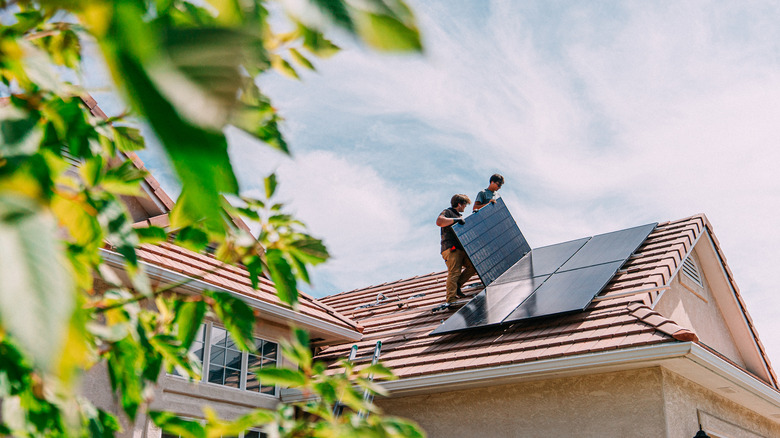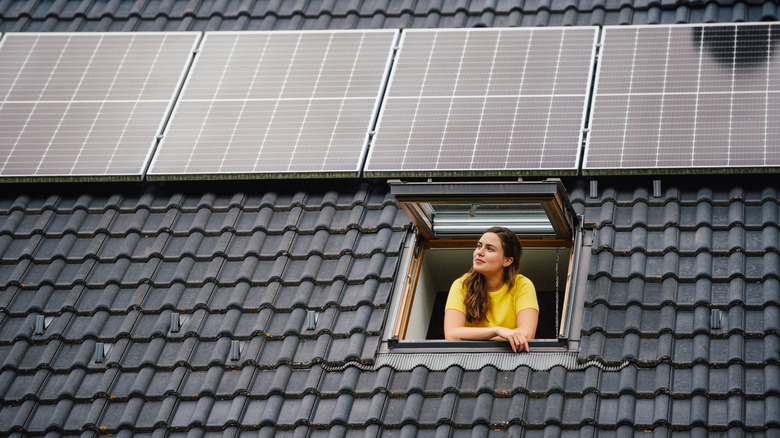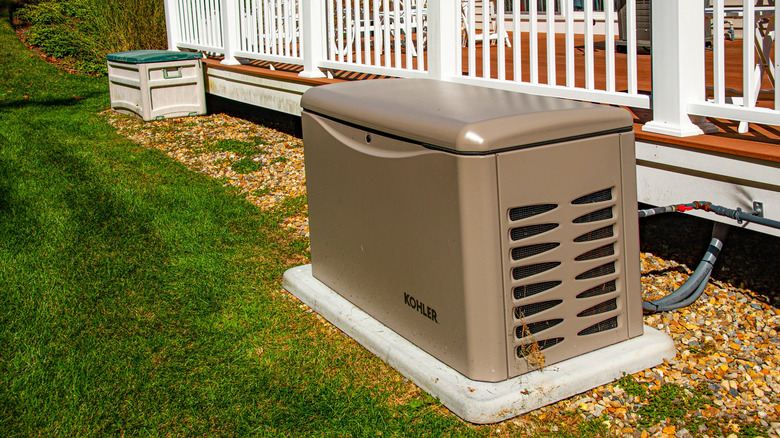Can Solar Panels Replace A Home Generator? Here's What You Need To Know
Homes traditionally run on power grids, but it isn't 100% reliable. Technical problems can happen at any time, high consumer demand leads to blackouts, and there's the occasional weather disturbance like hurricanes and snowstorms. If you live in an area where outages happen more often than you'd like, then it's a must to have backup power installed in your home. Two of the most popular options for this are solar panels and home generators.
Solar panels run on a renewable energy source. They convert sunlight into electricity that can then be stored in a large battery or used immediately to power your home. On the other hand, home generators rely on fuel, which can come in the form of either natural gas, diesel, gasoline, or propane. The generator burns this fuel to produce electricity that gets fed directly into your home.
Solar panels and home generators serve the same purpose, so it generally wouldn't be practical to get both systems on your property. If you already have a generator, though, would it be wise to switch it out for a solar panel system? Can solar panels even replace a home generator? Well, technically, yes, but there are things you need to know before installing solar panels on your home.
When solar panels can replace a home generator
Probably one of your biggest concerns about moving from a home generator to solar panels is whether they can power your entire home. The short answer is yes — solar panel systems come in 14kW sizes and beyond. In comparison, the average household only needs 6 to 8kW. So as long as your property can accommodate the number of solar panels required for your home, solar can definitely replace a generator.
Long-term cost is also another consideration. Home generators run on fuel, so expect to spend thousands of dollars on fuel alone. Meanwhile, solar panels don't cost a cent to operate. Once installed, they just use the sun to generate electricity. That means you're essentially getting power for free. If you want to save on operational costs, replacing your generator with solar panels is the way to go.
Besides the recurring operational cost, a generator's fuel dependency also causes another problem: once the fuel runs out, the power stops. Solar panels do work the same — they need consistent fuel (a.k.a. the sun) to work. However, unlike home generators, a solar panel system can be connected to a battery. This stores excess energy from the panels, and then provides the necessary power when the panels aren't actively producing any, such as at night or during bad weather.
It's also a good idea to replace your home generator with solar panels if you want a lower-maintenance system. Since solar panels have no moving parts, all the maintenance they need is occasional cleaning. Meanwhile, home generators require regular oil, filter, and coolant changes. A solar panel system can replace home generators if you have environmental concerns, too. Maybe your neighborhood is sensitive to noise or pollution, neither of which is a problem with a solar setup.
When a home generator might be better than solar panels
Solar panels have some major upsides over a home generator, but there are cases when they aren't a good replacement. One such scenario is if you have a large home and often experience days-long outages. Despite its scalability, a solar panel system is limited. You can only install so many panels on your property, and the battery has a certain capacity as well. That said, the system might not be enough to run your entire home during extended periods. On the other hand, a home generator can deliver power for days. Give it some fuel, and it will just keep going. Long outages also become an even bigger problem during bad weather. The performance of solar panels on cloudy days significantly drops to as low as 10%, so they might struggle to produce enough for your entire household and charge the battery for nighttime use at the same time.
If you're on a budget and want to keep upfront costs low, then solar panels won't replace a home generator. You'll still have to shell out a couple thousand dollars to have a standby generator installed in your home, though. The unit itself is around $4,000 to $5,500, while the fuel tank that runs it costs anywhere from $500 to $2,500. You'll also need an Automatic Transfer Switch (ATS) that automatically starts the generator up during an outage — this can range from $600 to $1,200. Then, of course, there are the installation fees, which can set you back $2,000 to $4,000. This can still be more affordable than getting a solar panel system, which requires anywhere between $15,000 and $40,000, depending on how large the setup will be.


